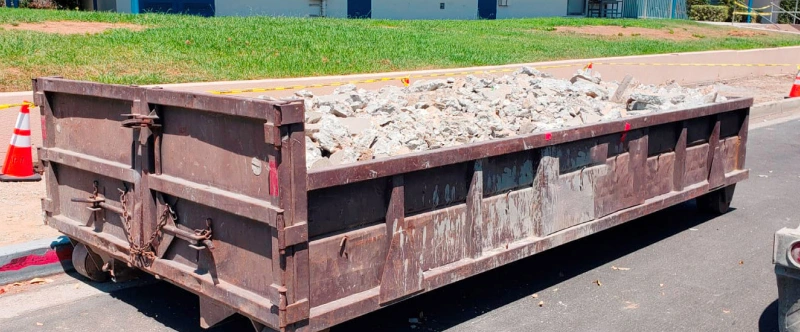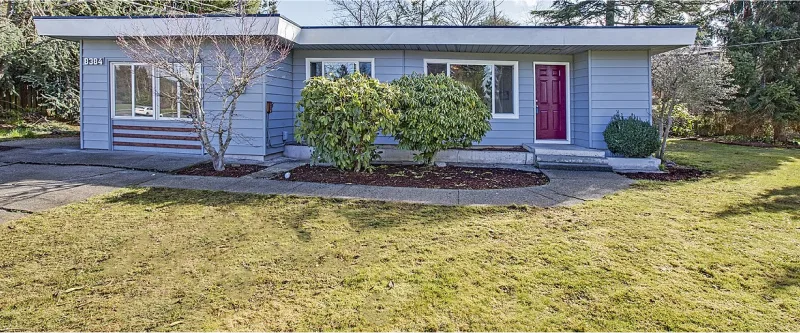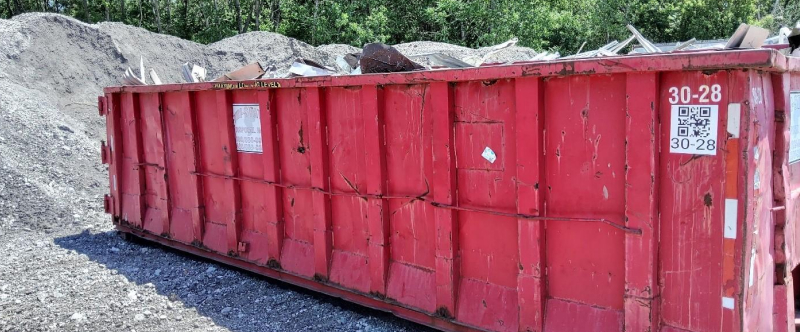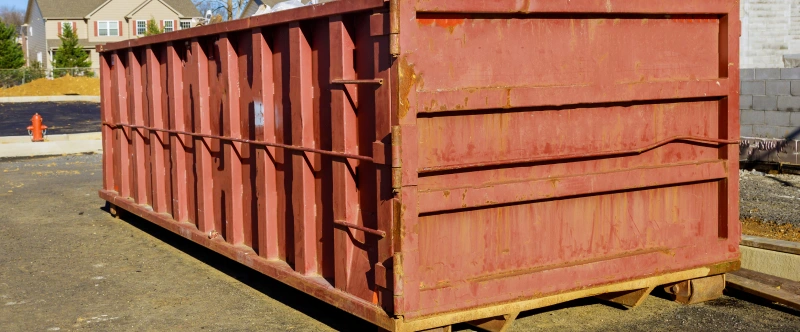When undertaking construction or demolition projects, one essential task is disposing of large amounts of concrete, asphalt, or brick. Whether you’re breaking down a driveway, renovating a home, or working on a commercial demolition site, renting a concrete dumpster ensures the proper disposal of this heavy material.
These dumpsters are built to withstand the immense weight of concrete and similar materials. They have reinforced sides and durable floors. They are typically used in settings where large amounts of debris need to be removed quickly and efficiently.
However, many homeowners and contractors don’t realize that the cost of a concrete dumpster can vary significantly based on several factors. In this guide, we’ll break down everything you need to know about the price, including ways you can save money.
1. Average Cost of Renting a Concrete Dumpster
The cost of your rental can range significantly depending on several factors. On average, you can expect to pay anywhere from $650 to $950, depending on the size, location, and duration of the rental.
Here’s a breakdown of what you can expect to pay based on dumpster size:
- 10-yard dumpster: $700-$750
- 15-yard dumpster: $750-$850
- 20-yard dumpster: $850 – $950
For concrete and other heavy debris, we typically recommend one of the following sizes:
- 10-yard dumpster – Ideal for small concrete jobs like sidewalks, steps, or small patios
- 15-yard dumpster – Great for slightly larger home projects with moderate concrete removal
- 20-yard dumpster – Works well for more extensive renovations or demolition with concrete involved
These sizes are designed to safely handle the weight of concrete while still giving you enough room to get the job done efficiently.
2. Concrete Dumpster Rental Pricing: Flat Rate & Clean Load Requirements
When it comes to renting a dumpster for concrete disposal, pricing is often handled differently than for other types of debris like construction and demolition (C&D) waste or junk removal. Concrete dumpster rentals are commonly offered at a flat rate with no weight limits, making them a cost-effective option for disposing of this heavy material—as long as it’s a clean concrete load.
What Is a Clean Concrete Load?
To qualify for flat-rate pricing, dumpster rental companies require that only concrete be placed in the container—free of any other materials such as wood, metal, plastic, or general debris. This is known as a clean concrete load. The moment other types of waste are mixed in, the load is no longer considered clean and becomes subject to standard weight restrictions.
“When concrete is properly separated and loaded into one of our concrete-only dumpsters, weight limit restrictions don’t apply,” says Bryan Goetz, CEO of S&A Container Service. “We don’t charge by weight for clean concrete loads — it’s all based on the yard. That means customers can dispose of this heavy material more affordably. By keeping concrete separate from other debris, we help Long Island contractors and homeowners significantly reduce their overall disposal costs. It’s a simple step that leads to big savings on job sites and renovations.”
Why This Matters: Weight Limits and Overweight Fees
Concrete is extremely heavy, and if your dumpster contains mixed debris, it will typically come with a weight limit based on the size of the container:
- A 10-yard dumpster may include 1-2 tons
- A 30-yard dumpster may include 4-5 tons
If your load exceeds the included weight, overage fees will apply—usually ranging from $95 to $185 per ton over the limit. For large-scale projects, this can lead to significantly higher costs if you’re not careful.
Tip to Save: Keep Concrete Loads Clean
To take full advantage of flat-rate pricing and avoid costly overweight fees, always ensure your concrete dumpster is loaded with concrete only. Even a small amount of mixed debris like wood or drywall can disqualify your load from flat-rate pricing and result in additional charges.
Rental Duration
Most dumpster rental companies offer a standard rental period of 7 to 14 days. However, if your project takes longer, you may need to extend the rental period, which will result in additional charges. Typically, additional days cost $10–$25 per day or weekly extensions that could average $100 per week that is beyond the initial rental period.
For example, if you’re working on a large demolition project that takes several weeks, be sure to factor in the cost of an extended rental period. On the other hand, if your project is completed sooner than expected, you can save money by returning the dumpster early and avoiding any extension fees.
Permit Fees
If you need to place the dumpster on public property—such as a street or sidewalk—you may be required to obtain a permit from the local municipality. Permit fees vary by location, with some areas charging $50 to $200 for permits..
Before getting your dumpster, check with your local building department to determine whether a permit is needed. In many cases, placing a dumpster on private property—such as a driveway or yard—may help you avoid permit fees altogether.
Disposal Fees
In addition to the rental cost, you may be subject to disposal fees. Concrete, brick, and other construction debris must be taken to specialized facilities for processing and recycling. These facilities may charge additional fees for the disposal of heavy materials like concrete, asphalt, and brick.
While clean concrete loads—free of any dirt, asphalt, brick, or mixed debris—typically qualify for flat rate pricing, any mixture of materials such as brick, asphalt, or dirt will shift the pricing structure to weight-based fees. Disposal fees can vary based on the type of material being disposed of and the facility’s location.
Be sure to ask your dumpster rental company about any additional fees for concrete disposal before finalizing the rental agreement.
3. How to Save Money on Concrete Dumpster Rentals
While renting a dumpster can be an investment, there are several ways to save money and avoid unnecessary costs. Here are a few tips to help you minimize expenses:
Choose the Right Size Dumpster
One of the biggest mistakes homeowners and contractors make is purchasing a dumpster that’s too large or too small for the project. If you rent a dumpster that’s too large, you may end up paying for unused space, while a dumpster that’s too small may result in overage fees for exceeding the weight limit.
To avoid these issues, carefully assess your project and choose a dumpster that’s appropriate for the amount of concrete you need to dispose of. A 10-yard dumpster is ideal for smaller home renovations, while a 30-yard dumpster is better suited for larger construction projects.
Consider Private Property Placement
If possible, place the dumpster on private property—such as a driveway or yard—to avoid the cost and hassle of obtaining a permit. This not only saves you money but also eliminates the risk of fines or delays that can occur if you place the dumpster on public property without the necessary permit.
Be Mindful of Weight Limits
Exceeding the weight limit of your dumpster can result in hefty overage fees. Be mindful of the weight of the concrete you plan to dispose of and try to avoid overloading the dumpster. If you’re unsure, ask the rental company for guidance on how much weight is acceptable for your selected dumpster size.
4. Common Uses for Concrete Dumpsters
These containers are commonly used in both residential and commercial projects. Here are a few examples of when you might need to rent one:
-
Home Renovations: Whether you’re replacing a driveway, tearing down a garage, or remodeling your home, these containers are perfect for handling the heavy debris that comes with demolition.
-
Construction Projects: Large-scale construction projects often generate significant amounts of concrete waste, making a concrete dumpster rental essential for efficient waste removal.
-
Commercial Demolition: When demolishing buildings, parking lots, or sidewalks, these dumpsters are needed to handle the large quantities of concrete and debris.
Conclusion
Understanding all of these charges is very important for folks renting a concrete dumpster, or other types such as a roll off dumpster, commercial dumpster, or residential dumpster.
When done correctly, your rental can be a practical and cost-effective way to manage heavy waste during construction and demolition projects. By choosing the right size and understanding the factors that affect pricing, you can avoid unnecessary fees and keep your project within budget.
With proper planning and research, getting a dumpster can streamline your waste disposal process, helping you complete your project efficiently and cost-effectively.



